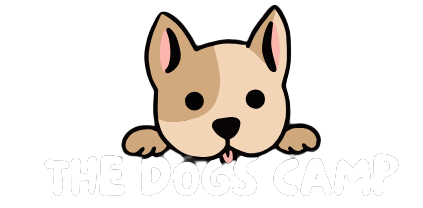Small Munsterlander Pointer Dog Breed Information
The Small Munsterlander Pointer is known for its agility, intelligence, and versatility. These dogs are excellent hunting partners and also make great family pets. They come from the Munster region in Germany and have a mix of traits that make them skilled in pointing and retrieving and very friendly.
When looking at the Small Munsterlander Pointer, it’s interesting to consider the history and culture that have influenced the breed. The breed’s strong hunting instincts and pleasant nature have been shaped by its origins and development in Germany.
People thinking about getting one of these dogs need to know about their health care, grooming, and what they should eat to keep them healthy and energetic. Owners must pay attention to the specific needs of these dogs, such as regular exercise, proper grooming, and a nutritious diet, to ensure their well-being.
Key Takeaways
- Versatile hunters, friendly family companions.
- Originating in Germany, it was bred for hunting and temperament.
- Health requires exercise, grooming, and a balanced diet.
Quick Facts
The Small Munsterlander Pointer is a well-regarded hunting dog known for its love of water and impressive hunting versatility. These dogs stand about 20.5 to 21 inches in height and weigh 40 to 60 pounds. They have a healthy lifespan of around 12 to 14 years.
When it comes to hunting, they have a solid pointing instinct and are highly sought after by those needing a dependable hunting partner. Their medium build contributes to their agility and stamina, ideal for various hunting environments.
The breed has gained support from the Small Munsterlander Club of North America, and its status is strengthened through the efforts of the Kleine Munsterlander-Group North America. This partnership works to maintain the breed’s standards in line with those established in Germany, aiming for consistency in breeding and training processes.
Training a Small Munsterlander can be straightforward, although some dogs may be a bit headstrong or take longer to reach maturity. Despite these differences, many dogs are ready to start hunting after their first training season. Their expressive eyes and well-proportioned bodies easily recognize them. They have a medium-length, shiny, thick coat with distinctive brown patches over a white background that may be ticked or solid.Small Munsterlander Pointer Dog Breed Pictures
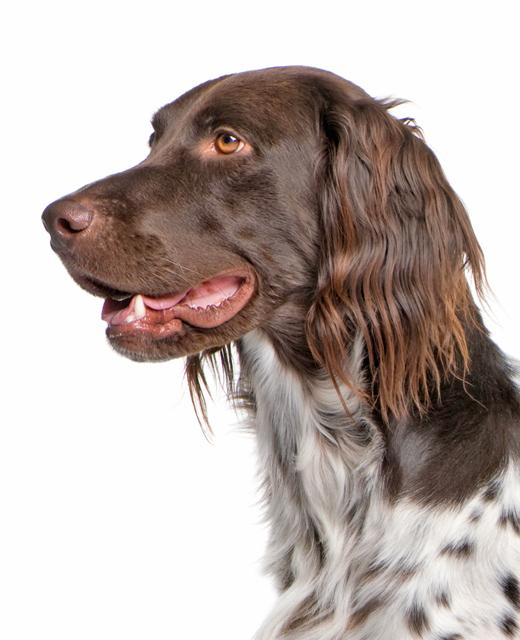
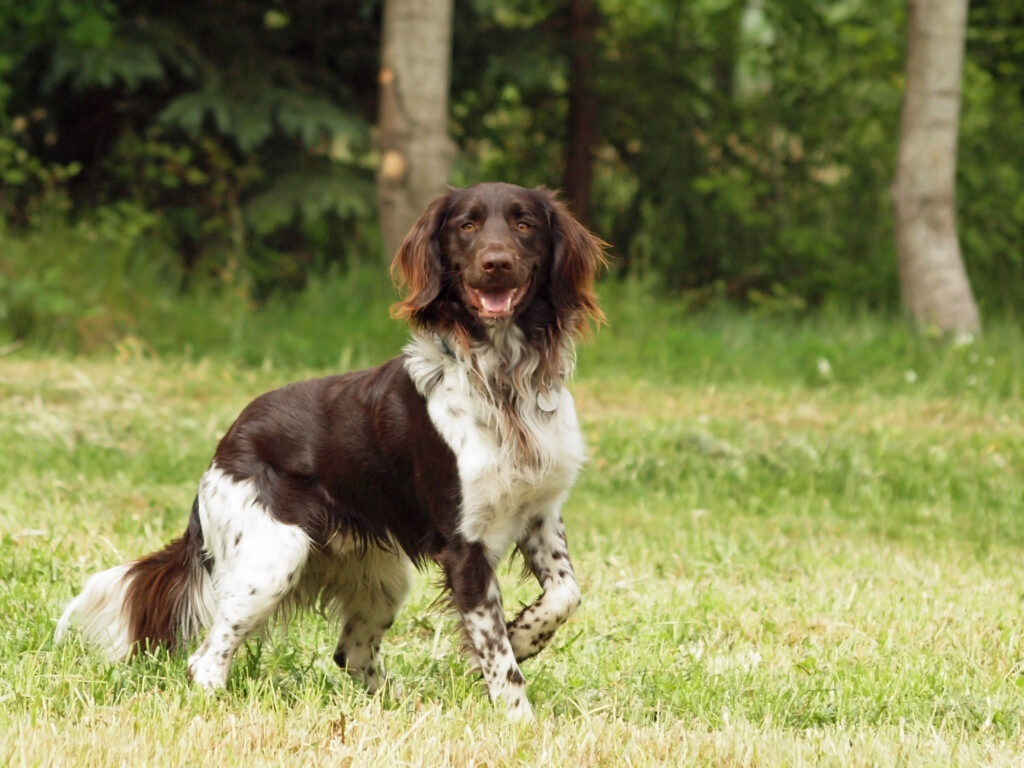
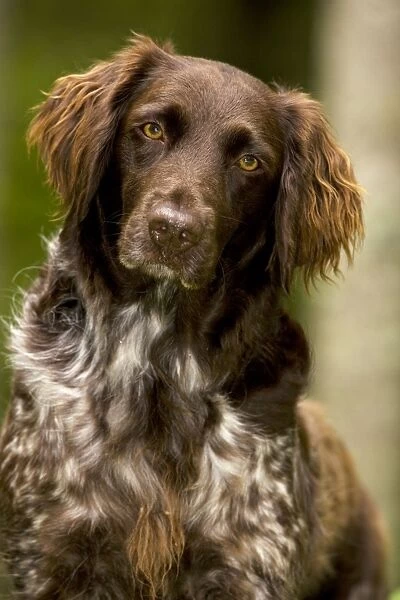
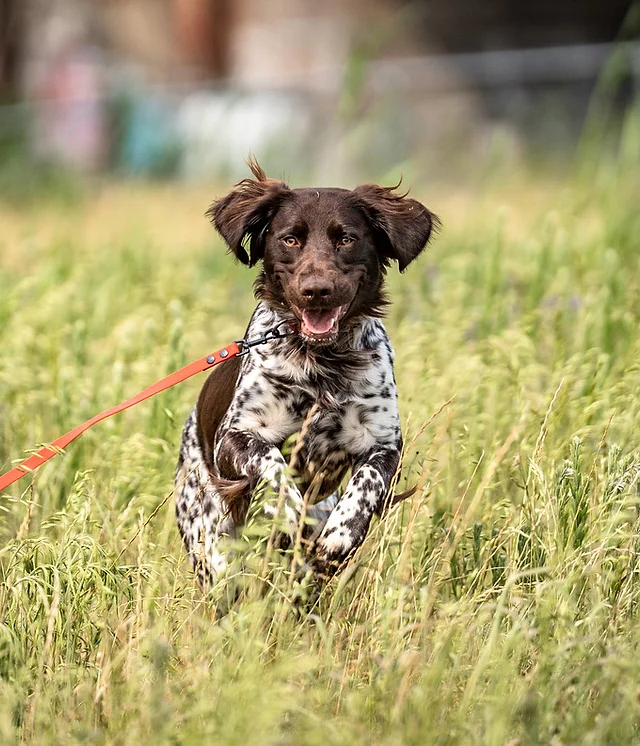
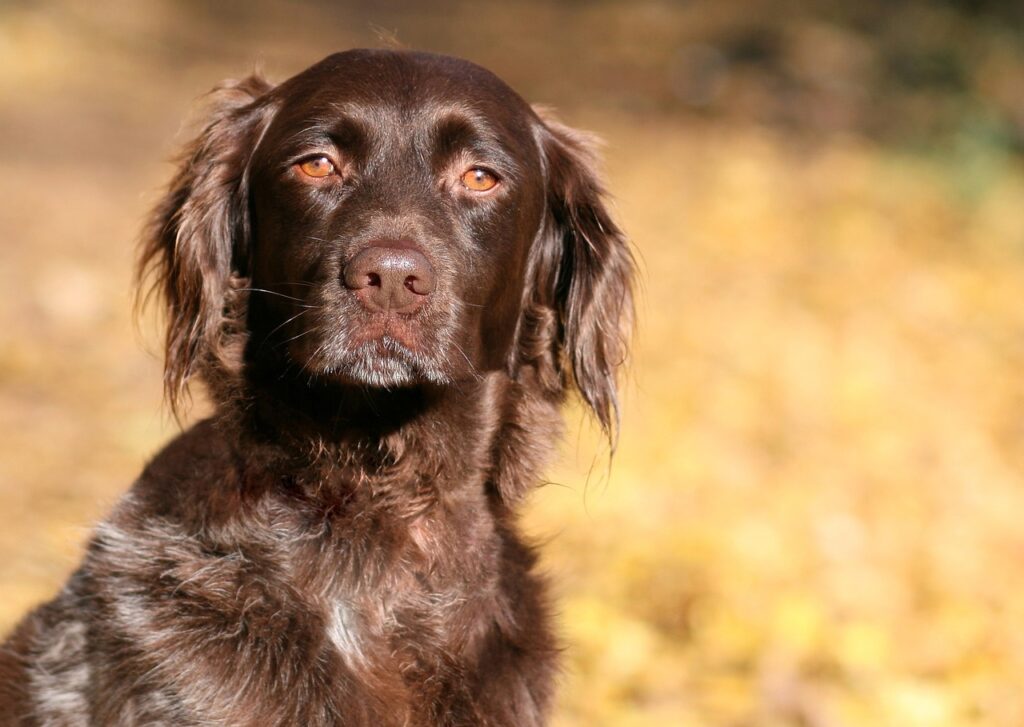
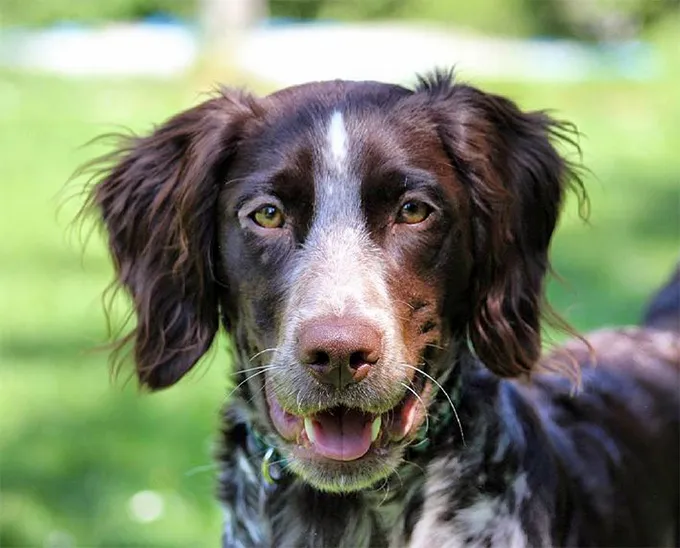
Overview
The Small Munsterlander Pointer is a well-rounded breed known for its impressive hunting skills and dynamic physical qualities. With a height ranging from 20.5 to 21 inches and weighing between 40 and 60 pounds, these medium-sized dogs are built for agility and stamina. They typically enjoy a healthy lifespan of 12 to 14 years, comparable to other breeds of similar size.
This breed’s strong instinct for pointing makes them excellent at retrieving, particularly when hunting upland birds or waterfowl. They have a moderate hunting range and are pretty adaptable, which makes them reliable in various hunting scenarios. The Small Munsterlander is recognized by the American Kennel Club, ensuring that they meet well-defined standards and come from a lineage of quality breeding.
For those considering a Small Munsterlander as a pet, be prepared to commit to their training and mental stimulation needs. These intelligent dogs require regular activities to satisfy their hunting instincts and to keep their energy levels in check. Proper training and exercise are essential for maintaining the health and happiness of these capable and energetic dogs.
Versatile Hunting Abilities
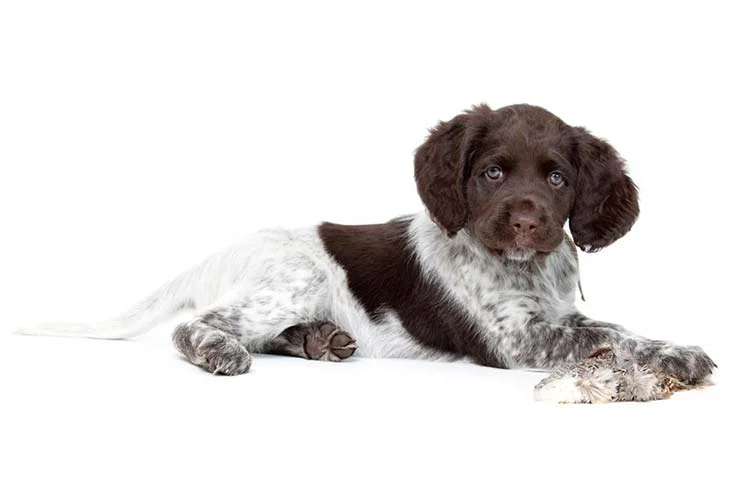
Small Munsterlanders are talented hunters, excelling in a variety of landscapes. Their skills in retrieving and pointing make them invaluable partners in hunting upland birds and waterfowl. Their athleticism and adaptability are especially useful for hunters who appreciate dogs that can handle different hunting scenarios.
Training these dogs starts early, focusing on ensuring they retrieve effectively. They thrive in fields and aquatic settings due to their love for water and ability to cover a medium range. Not only are they great in the wild, but they’re also calm at home, making them good family pets. To find a Small Munsterlander with strong hunting instincts, look for puppies from reputable breeders and clubs with a history of hunt testing.
Here’s a snapshot of their hunting skills:
| Hunting Skill | Description |
|---|---|
| Natural Retrieving | Excellent at finding and indicating where the game is hiding |
| Pointing Instincts | Awesome at finding and showing where the game is hiding |
| Training Adaptation | Respond well to early and systematic training methods |
| Environmental Range | Skilled in a range of landscapes, including wetlands and grasslands |
| Upland Game Hunting | Expertise in locating and retrieving game birds in upland areas |
For hunters looking for a dog that can do it all, the Small Munsterlander is an outstanding choice. They bring a mix of field savvy and home manners that’s hard to beat.
Breed Origins
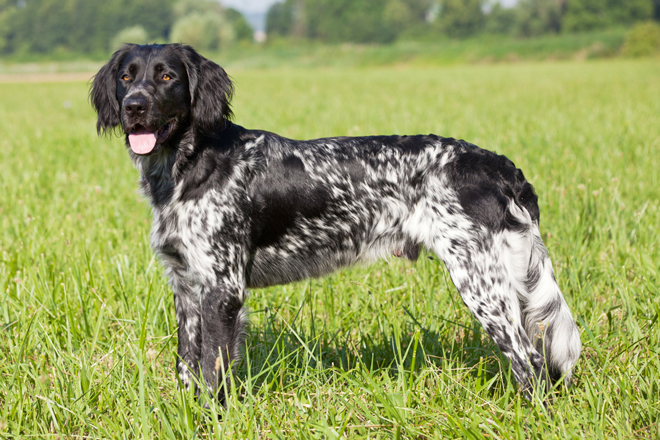
The Small Munsterlander Pointer is a breed from the Munster region in Germany. It’s been carefully developed since the early 1900s to be an effective hunting dog. Breeders in Germany focused on improving the dogs’ natural skills in pointing and retrieving. These skills made the breed highly valued for its adaptability in different hunting scenarios.
With roots in the strong hunting culture of the Munster region, the Small Munsterlander has a rich European heritage. The breed is known for being an excellent hunting partner. This is due to its ability to perform well in various environments.
Historical Development
The Small Munsterlander Pointer originated in Germany’s Munsterland region in the early 1900s. It was created by mixing local pointers with other hunting breeds to improve their skills. The breed standards were carefully crafted to maintain and enhance their abilities as all-around hunters. These dogs have a strong hunting drive, are excellent at pointing, and love water.
In North America, breed clubs like the Small Munsterlander Club and the Kleine Munsterlander Group have been essential in developing the breed. They work closely with German clubs to refine the Small Munsterlander’s traits. Thanks to these efforts, the breed is gradually gaining recognition among hunters in North America.
Hunting Heritage
The Small Munsterlander Pointer was born out of the Munsterland region in Germany, where hunting upland game birds and waterfowl was a way of life. This breed evolved by focusing on traits such as reliable pointing and a strong desire to pursue, making them experts at finding and retrieving games.
Their impressive hunting abilities come from a mix of local pointing dogs and superior hunting breeds like the Large Munsterlander and the French Brittany. This combination improved their skills in the water and gave them a well-rounded nature.
Today, the Small Munsterlander stands out as a multifaceted hunting dog, known for working efficiently in the field and being accessible to train.
European Beginnings
Originating from the rich hunting territories of Germany’s Munsterland, the Small Munsterlander was carefully bred in the early 20th century. This breed is known for its exceptional pointing and retrieving skills on land and water. These European roots reflect dedicated efforts to refine the dog’s natural talents, creating a competent hunting partner. Breed standards were formalized in Germany and swiftly embraced across Europe.
The Small Munsterlander Club of North America has played a crucial role in introducing this breed to hunters and families in the U.S. and Canada. Their work ensures that the Small Munsterlander’s reputable hunting lineage is preserved and that the breed thrives as an outstanding sporting dog and a lovable household companion.
Medium-Statured Breed
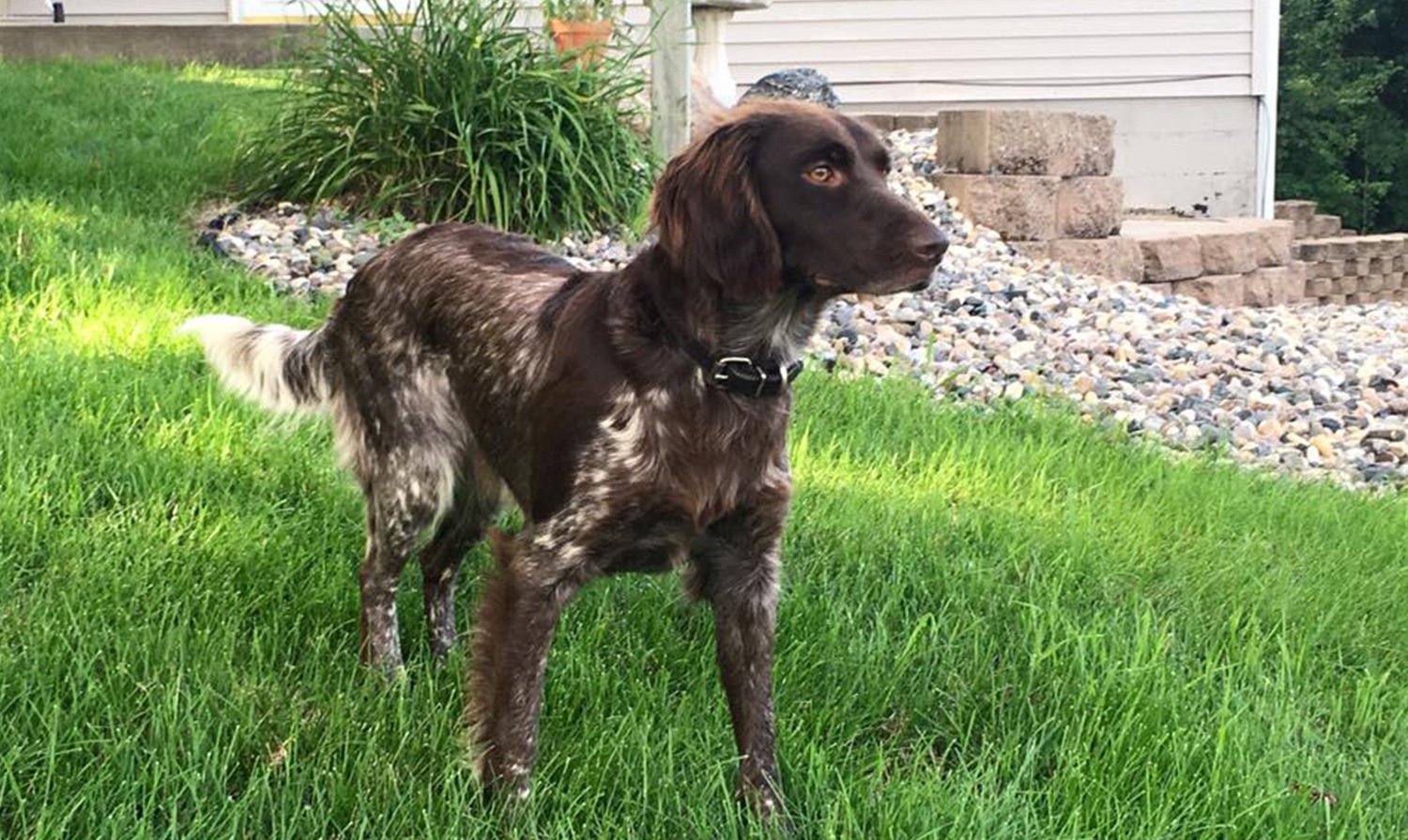
The Medium-Sized Munsterlander Pointer stands out for its well-proportioned body, which is 20.5-21 inches tall. This breed is known for its shiny coat and active nature. Their need for movement means they thrive in spaces where they can exercise regularly. When considering a Munsterlander Pointer as a pet, consider its high energy and how it fits your family dynamic.
These dogs have a muscular build and a dense and shiny coat. They move with a purposeful stride that reflects their athletic background. A Munsterlander Pointer needs daily physical activity and mental challenges to stay happy and healthy.
They can adapt to an apartment for living accommodations if they exercise enough daily. This makes them versatile companions for various living situations. Their friendly nature makes them a good fit for families, but their exercise needs must be met to prevent restlessness.
Breed Size Characteristics
Small Munsterlander Pointers are the perfect mix of agile and sturdy, making them great for play and work. They stand between 19 to 22 inches tall and weigh a substantial 35 to 60 pounds. Their size is great for those who want a dog that’s easy to handle but still loves to get out for some fun exercise.
These dogs live for about 12 to 14 years, offering long-term companionship. They’re known for their hunting skills and easygoing nature, which makes them suitable for different kinds of homes, even smaller spaces like apartments, as long as they get enough exercise.
If you’re thinking about getting one, it’s wise to research and talk to breed clubs to find the perfect Small Munsterlander for your life.
Ideal Living Spaces
Small Munsterlander Pointers, despite not being large dogs, can adapt well to a range of homes, including apartments. They can thrive in these environments with plenty of exercise and mental stimulation. These dogs can live comfortably in compact spaces when their energy is channeled through regular physical activity and proper training.
When selecting a dog for an apartment, it’s essential to consider how the breed typically behaves and its energy needs. Small Munsterlander Pointers are known for being calm and well-mannered, making them a good fit for indoor living. They’re adaptable and tend to be quiet and courteous. However, they must still get enough exercise and mental challenges to stay happy and healthy.
Physical Appearance Traits
The Small Munsterlander Pointer thrives with plenty of exercise and mental stimulation thanks to its unique body structure. These dogs typically stand between 20.5 and 22 inches tall and weigh 35 to 60 pounds. Their build is robust and well-proportioned, essential for their agility and stamina during physical activities.
They have a medium-length, shiny, thick coat that can be straight or slightly wave. This type of coat does require consistent grooming because it can shed.
Health is a priority in breeding, with efforts to reduce the risk of hip dysplasia, a common issue in dogs of this size. The Small Munsterlander Pointer’s appearance, with its soft, expressive eyes and well-structured frame, reflects its intelligent and trainable nature. This makes them excellent companions for hunting and other outdoor pursuits.
Activity Level Requirements
The Small Munsterlander Pointer thrives on regular exercise due to its active nature and athletic physique. This breed’s hunting heritage means it loves to engage in activities like tracking and retrieving.
With a medium-sized body built for stamina, the Small Munsterlander Pointer needs a mix of physical and mental workouts to stay in top shape. Swimming and running are great ways to meet their exercise needs, especially since they enjoy water and have a lot of stamina.
It’s also essential to keep up with their bursts of energy when they’re working or playing to ensure they’re happy and healthy.
Suitability for Families
Small Munsterlander Pointers are excellent family dogs because they are loving and can easily adjust to new environments. They are confident, making them great companions for adults and kids. These dogs must be trained well to curb their natural enthusiasm, especially their habit of jumping up.
They are medium-sized dogs that need a good amount of exercise and mental stimulation daily to stay calm inside the house and be happy overall.
If you’re considering getting a Small Munsterlander, it’s best to get one from a trusted breeder or adoption center that can give you detailed information about the dog’s health. When adopting, it’s essential to ask about the dog’s activity level, behavior, and any health issues they might have. Having a clear adoption contract and taking the dog for a veterinary check-up right after bringing them home are essential steps to ensure they fit nicely into your family.
Temperament Traits
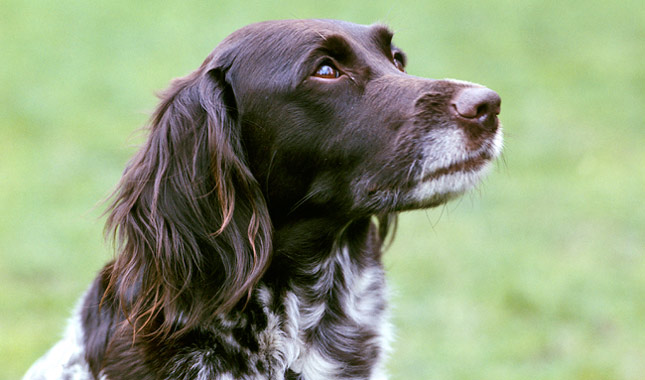
The Small Munsterlander Pointer is known for its distinct personality traits, making it an excellent hunting partner and a great family dog. These dogs are intelligent, easy to train, and sensitive, so they need careful attention to keep their minds and bodies active. Giving them enough activity and love is essential to keep them happy.
- They are warm and loving with family members.
- Their hunting instincts are strong, and they have a lot of drive.
- They are brilliant and react well to training.
- They are full of energy and need plenty of exercise and playtime.
These traits mean that the Small Munsterlander Pointer needs an owner who will spend time training and playing with them. Keeping them busy with activities like fetch, agility courses, or outdoor adventures can help channel their energy positively. When they’re not out in the field, they’re happy to relax with their humans, showing their softer, affectionate side.
Friendly Family Companion
Small Munsterlander Pointers are renowned for their sharp minds and ease of training, making them a perfect fit for families. Their even-tempered nature, blended with a caring disposition, suits family life well. These dogs are quick learners, which makes teaching them good behavior around your loved ones a breeze.
While they have a natural hunting instinct, they know how to switch gears and be calm, affectionate pets at home.
Physical activity and mental stimulation are crucial to keeping these energetic dogs happy and well-behaved. Their sturdy physique and expressive faces reflect their friendly nature.
Responsible breeding, including health checks, is crucial to ensure these dogs are healthy and ready to be a part of your home.
Hunting Instincts
Small Munsterlander Pointers are beloved as friendly pets, but they also have a strong hunting instinct. Thanks to their selective breeding, they are particularly good at tracking and retrieving both land birds and waterfowl. These dogs have a powerful pointing instinct and are capable hunters over medium distances. Their ability to learn and adjust is evident in their versatile hunting skills.
These dogs need regular exercise and activities that tap into their hunting abilities to stay happy and healthy. Their willingness to learn makes training them to use their instincts in productive ways possible. For Small Munsterlanders, tracking, pointing, and fetching games are done with enthusiasm and focus.
Intelligence and Trainability
Small Munsterlander Pointers are known for their exceptional intelligence and are a breeze to train. They pick up new commands quickly and are always keen to meet their owner’s wishes. Thanks to their smarts, these dogs are pretty trainable. However, they need plenty of physical activity and brain games to prevent bad habits, mainly because they have a strong instinct to chase.
These dogs are generally healthy, thanks to careful breeding that prioritizes their overall well-being. At home, Small Munsterlanders are calm and adapt well to living indoors. They’re friendly and loyal, making them great additions to any family.
Energy and Playfulness
Small Munsterlander Pointers are known for their high energy and joyful temperament, making them perfect companions for those with an active lifestyle. These dogs thrive on consistent exercise and mental challenges to stay happy and healthy.
Playing fetch or participating in agility courses helps them burn off energy and keeps their minds sharp. They love interactive play, which strengthens their connection with their owners.
Activities like hiking, running, and swimming are excellent for Small Munsterlanders to express their lively personalities. Using interactive toys and puzzles can keep them mentally stimulated and prevent boredom.
Such engagement results in well-adjusted and satisfied canine friends.
Sensitivity and Affection
Small Munsterlander Pointers are known for their lively spirit but also have a deep sense of sensitivity and affection. These qualities help them create strong connections with their owners. They’re very in tune with the feelings in their home, quickly picking up on their owner’s emotions. This makes them thoughtful pets who often want to be close to their humans, preferring soft and gentle interactions.
When it comes to being part of a household, the loving nature of these dogs makes them a great fit, especially for those seeking a pet that understands emotions well. In training situations, Small Munsterlander Pointers shine when positive feedback is used. They love to make their owners happy and thrive on the kind of encouragement that tightens the bond between them and their families.
Breed Health Considerations
For owners and breeders of Small Munsterlander Pointers, it’s crucial to be aware of the breed-specific health issues that may arise. Regular health screenings can help detect inherited diseases early, critical for the dogs’ health.
Caring for these dogs involves consistent grooming to keep their coat and skin healthy.
Exercise is another crucial aspect of a Small Munsterlander Pointer’s health. Owners should provide enough physical activity to prevent weight gain, which could lead to other health problems. Keeping an eye on their ears is also essential, as these dogs can be prone to infections due to their floppy ears.
Genetic Health Concerns
The Small Munsterlander Pointer is typically a healthy dog breed, but it’s essential to be aware of certain inherited conditions that can affect them.
Hip dysplasia is a common issue involving abnormal development and deterioration of the hip joints.
Eye problems like cataracts and progressive retinal atrophy also occur in this breed.
To help keep these issues at bay, breeders should conduct thorough health screenings and genetic tests before breeding. This proactive approach helps ensure the health of future puppies.
Breeders should also be transparent about the breed’s health risks with potential owners.
Regular Grooming Needs
Caring for Small Munsterlander Pointers goes beyond watching out for their health issues—it also involves their grooming needs. These dogs have a medium-length coat that shines and is quite thick. To keep it looking good and prevent tangles, owners should brush their dogs once a week. This not only keeps the coat shiny but also helps to reduce shedding by getting rid of dead hair.
When these dogs return from the field, a thorough grooming session removes stubborn dirt and protects their skin from irritation. Keeping their nails trimmed is critical to avoid discomfort and potential problems with walking. Clean ears help prevent infections, and regular tooth brushing removes dental issues.
Consistent grooming contributes to the Small Munsterlander’s health, ensuring they stay active and lively.
Exercise for Well-being
Regular exercise is necessary for Small Munsterlander Pointers due to their high energy and instinctual need to hunt. These dogs thrive on strenuous activities that tap into their endurance and agility. Simulated hunting exercises like retrieving and participating in field trials are perfect for them, as these activities align with their inherent instincts.
Including swimming or fetching in water can benefit Small Munsterlander Pointers since they enjoy water, and it’s good for their health. Regular training classes also help keep their minds sharp and prevent negative behaviors.
Along with routine vet check-ups to check for hereditary conditions and keep an eye on their weight, a well-rounded exercise routine is vital in keeping these dogs happy and healthy.
Grooming Requirements
Caring for a Small Munsterlander Pointer’s coat is vital to keep it shiny and healthy. Regular brushing is necessary to handle the natural shedding and remove any knots, especially with more extended fur.
In addition to coat care, there are other critical steps in a proper grooming routine. These include brushing the coat often to keep it looking good, preventing it from getting tangled, and giving your dog baths when needed using a shampoo made just for dogs. It would be best to trim your dog’s nails to avoid problems from getting too long and clean your dog’s ears often to stop infections and keep their hearing clear.
Caring for this breed means grooming for their appearance and overall well-being. Baths help to keep their skin clean and free of irritants. Trimming nails is about more than looks; it helps prevent pain and posture problems. Ear care is crucial because it can prevent painful infections that could lead to hearing loss. Following these steps ensures your Small Munsterlander Pointer stays healthy and happy.
Coat Type & Care
Small Munsterlander Pointers have a medium-length coat that’s quite dense and requires regular grooming to stay healthy and shiny. Weekly brushing is a must, and after any outdoor adventures, you’ll want to clean them up to keep their coat in top shape. Their straight or wavy fur features eye-catching brown patches against a white background that may be ticked or solid. Bathing them on a regular schedule keeps their coat fresh and bright.
Maintaining this breed’s coat also includes trimming their nails regularly, cleaning their ears, and practicing good dental hygiene to avoid health problems. These dogs are hearty, but it’s essential to watch for skin dryness in colder climates and to check their ears after they swim to prevent infections. A well-maintained coat is not only about looks – it ensures the dog’s comfort and can help them perform better during training activities.
Brushing Frequency
Maintaining the coat of a Small Munsterlander Pointer is vital for its health and appearance. Regular brushing is necessary, ideally two to three times weekly, to prevent mats and remove loose fur. This grooming routine helps spread the dog’s skin oils, which keeps their coat shiny and healthy and reduces hair around your home.
When the Small Munsterlander is shedding more than usual, you might need to brush them daily to keep up with the hair loss. Pay special attention to areas where knots can form, like the ears, feet, and tail, every time you groom.
Getting your Small Munsterlander used to being groomed early on will make it a comfortable activity for them.
Bathing Recommendations
Following a regular bathing routine for your Small Munsterlander Pointer is essential for healthy skin and a shiny coat. Ideally, it would be best to bathe your dog every four to six weeks using products specifically designed for dogs. Using the right shampoo and conditioner helps keep their skin irritation-free and maintains the natural oils they need for a healthy coat.
After bathing your dog, it is crucial to make sure they are thoroughly dried. This helps prevent any skin issues that may arise from dampness and prevents their fur from matting. Proper drying techniques are essential for maintaining your dog’s coat’s overall health and appearance.
In addition to regular bathing, regular brushing is vital in keeping your Small Munsterlander Pointer’s coat looking great. Regular brushing helps to remove dead hair and prevents knots from forming. This keeps their coat looking neat and contributes to their overall comfort and well-being.
Ear care is another important aspect of grooming for your Small Munsterlander Pointer. Especially after bathing or swimming, paying attention to their ears is crucial to help avoid ear infections. Proper cleaning and drying of the ears can significantly reduce the risk of infections and other ear-related issues.
Shedding Management
To keep a Small Munsterlander Pointer’s coat shiny and healthy, it’s essential to bathe them regularly and brush their coat every week. This breed’s coat is medium-length, polished, and thick, so brushing helps prevent too much hair from building up and keeps the coat in good condition. After they’ve been out hunting, grooming them to remove any dirt or things stuck in their fur is also essential.
Taking care of their nails, ears, and teeth is just as crucial for their health. Small Munsterlanders don’t usually shed a lot, but sticking to a good grooming routine can help keep any shedding under control.
If you’re thinking about getting one of these dogs, go to a trustworthy breeder or shelter where the dogs come with health guarantees and certifications. This can help you avoid any genetic issues affecting how much the dog sheds.
Nail & Ear Maintenance
Keeping your Small Munsterlander Pointer’s nails trimmed is essential for their comfort and mobility. Overgrown nails can cause pain and interfere with their walking, potentially leading to injury. It’s necessary to keep their nails at a proper length to prevent issues.
This breed must have Clean ears to avoid wax build-up and potential infections. Regularly cleaning their ears with a vet-recommended solution helps stop problems before they start. Watch out for signs of trouble, like redness or an unusual smell, which could indicate an infection.
Using treats and praise makes grooming a positive experience for your dog. It’s also wise to get tips from a professional on trimming nails and cleaning ears to keep your Small Munsterlander healthy and happy.
Dietary Needs
Caring for the dietary needs of Small Munsterlander Pointers involves a well-rounded approach that supports their active lifestyle. It’s essential to provide a diet that fuels their energy and aids in repairing and growing tissues. Knowing what foods could cause allergies and setting a consistent feeding routine helps prevent health issues and keeps them in shape.
- Nutritional Needs: They thrive on a protein-rich diet with vital vitamins and minerals.
- Food Allergies: Be proactive in identifying and managing any food sensitivities.
- Feeding Schedule: Consistent meal times help balance energy throughout the day and control weight.
- Portion Size: Adjust the food amount based on the dog’s age, size, and exercise habits.
Nutritional Requirements
Small Munsterlander pointers need a diet of quality proteins, fats, and vital micronutrients. This combination supports their high energy levels and maintains their health. The right mix of nutrients depends on the dog’s age, size, and how active they are. It helps with growth, energy, and keeping muscles strong.
Proper nutrition prevents overweight dogs, which can lead to health problems for this breed. Serving controlled portions is essential, whether the food is bought or homemade. Dogs always need access to fresh water to stay hydrated and maintain a healthy weight.
Working with a vet can help create a diet plan that considers any particular health needs, ensuring the Small Munsterlander’s nutritional requirements are precisely met.
Common Food Allergies
The health of Small Munsterlander Pointers must be aware of their potential food allergies. These dogs may experience discomfort from allergic reactions such as excessive scratching, tummy troubles, ear infections, and persistent diarrhea.
Identifying and avoiding foods like beef, dairy, wheat, eggs, chicken, lamb, soy, pork, rabbit, or fish that could trigger an allergic reaction in Small Munsterlander Pointers is necessary. It’s essential to work with a vet to carry out allergy tests or start an elimination diet to pinpoint the food problem.
For dogs in a breeding program, following a diet free of allergens is essential to prevent passing on food sensitivities to their puppies. Managing these allergies often means switching to a hypoallergenic diet or preparing special home-cooked meals under the guidance of a vet.
This ensures that these active dogs maintain their health and are not slowed down by food-related issues.
Ideal Feeding Schedule
For adult Small Munsterlander Pointers, a consistent feeding schedule of two meals per day is vital. These dogs are active, so their diet should be packed with protein and essential nutrients to match their energy levels. It’s also important to keep an eye on their weight and adjust food amounts to avoid the risk of obesity, a concern for this breed.
Puppies, still growing, need to eat more often – about three to four meals daily. Puppies need more meals to support their growth. Always ensure they can access fresh water, especially after exercise or in warm weather, to prevent dehydration.
For the best diet plan tailored to your dog’s needs and activity, seek advice from a vet. This is especially helpful to address any particular health issues your Small Munsterlander might have.
